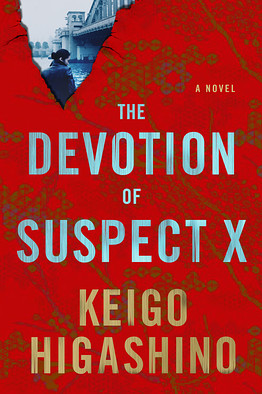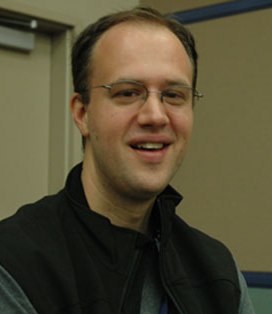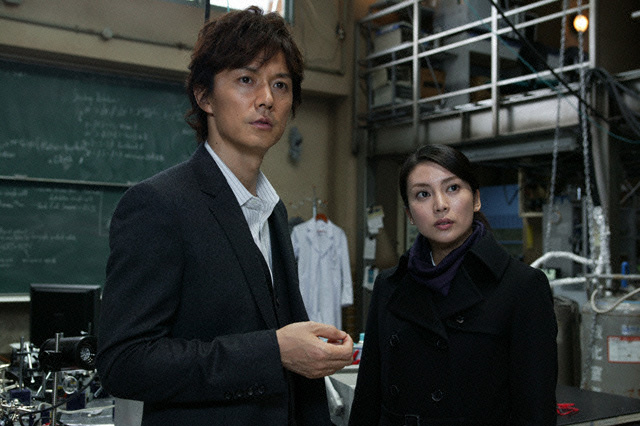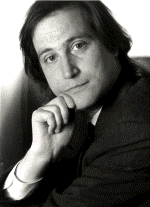 Mystery is one of my favorite genres,
so I was excited to get The Devotion of
Suspect X by Keigo Higashino (Minotaur Books, $24.99, February 2011). Though
Higashino is one of the most successful writers in Japan and Asia, this is only
the second of his novels to be published here.
Mystery is one of my favorite genres,
so I was excited to get The Devotion of
Suspect X by Keigo Higashino (Minotaur Books, $24.99, February 2011). Though
Higashino is one of the most successful writers in Japan and Asia, this is only
the second of his novels to be published here.
His first novel came out in 1989, and
his breakout was the 1999 novel Himitsu
(The Secret), which was an
award-winning bestseller and the basis for a hit Japanese movie (remade later
by Luc Besson in France); it's scheduled to be a Japanese TV series. Since that
breakout novel, Higashino's work has simply exploded.
His work was translated into Chinese
about two years ago and now he's possibly the bestselling novelist in China, selling
hundreds of thousands of copies. In Japan, Higashino has assumed an almost
iconic status. He and Haruki Murakami are often cited in tandem as the two
major writers that a general reader would be expected to know immediately, like
Stephen King or James Patterson.
I am intrigued by Japanese mysteries
because there is something "other" about them, something more formal,
beyond being set in another culture. When I found out that Higashino doesn't
give interviews--common among celebrities in Japan--it occurred to me that
interviewing his translator might give me, and other fans, some insight into
Japanese mystery writing. So I called Alexander O. Smith, the primary
translator, with a few questions.--Marilyn Dahl
 What is there about Japanese
mysteries that makes them different?
What is there about Japanese
mysteries that makes them different?
Well, I
think there are a number of angles you could go at that question from. By the
formal nature, I assume you're talking about the scene structure that strikes
you....
A little bit. And sometimes the
interactions, or the characters' demeanor--there seems to be a certain calmness
in a lot of the characters, even when they're plotting something or have done
something bad. For instance, one sentence says, "Ishigami's reply was
calmly mechanical," and that seems to be a common theme.
Part of
this is surely coming from the nature of [the protagonist] Ishigami--a man
whose true devotion is to mathematics first. But the other characters are talking
across metaphorical (and in some cases, physical) walls. It makes the "Devotion"
in the title sound rather ironic.
Style-wise,
Higashino feels very Western to me. He's drawing much less from the set-piece
style of writing you see going all the way back to the Tale of Genji, where a lot of the characters are interchangeable
and it's really all about setting up these moments, these sort of perfect
scenes--somebody peeking through a hole and somebody falling in love at first
sight.
Higashino
has a bit of that Japanese emphasis on the scene, together with the Western
emphasis on motivation and characterization, and I think the really successful
authors mix the two quite nicely. In The
Devotion of Suspect X in particular, his style is very sparse, and feels
very modern in that way.
And it seems very cinematic. When Yasuko is being driven home in the taxi with Kudo, and Ishigama is
waiting with his umbrella at the bottom of the steps, I could visualize that
perfectly.
Yeah, that's
a great scene, a great moment. And it translates really well into what are
called "home dramas"--a cross between soap operas and miniseries, basically
soap operas with a clear beginning and ending, running in prime time for one or
two seasons on Japanese TV. Almost every mystery book that Higashino Keigo has
written has been made into a home drama. The
Devotion of Suspect X and the characters in it inspired a home drama called
Galileo, where the Yukawa character,
the professor, becomes the main protagonist, and he goes around solving
mysteries.
 One of the
interesting changes that happened in the TV version was they decided to add a
little more on-screen tension and 'sexy' it up. Instead of using the detective
Kusanagi as the main foil to Yukawa, they changed his sidekick to a woman. That
adds a number of new story elements to play with: the role of the woman in a male-dominated
Japanese police force, and the sexual tension, or lack thereof, between her and
the ethereal professor Yukawa.
One of the
interesting changes that happened in the TV version was they decided to add a
little more on-screen tension and 'sexy' it up. Instead of using the detective
Kusanagi as the main foil to Yukawa, they changed his sidekick to a woman. That
adds a number of new story elements to play with: the role of the woman in a male-dominated
Japanese police force, and the sexual tension, or lack thereof, between her and
the ethereal professor Yukawa.
The changes
propagated back to the novels, too. For his subsequent book, Higashino adopted
the home drama idea, and he made the sidekick to the lead detective a woman.
I think it's
interesting that the cinematic moments in The
Devotion of Suspect X lead to a cinematic treatment (on the small screen), which
then influenced the future novels in the series. The Professor Yukawa novels are
not a chronological series as much as a series with the same characters--a
classic detective series, in other words.
I like the "otherness" of this
book, but if I were a bookseller, how would I sell this to someone who has not
read Japanese mysteries before, or read a couple and was put off?
Well,
it does require a bit of suspension of comfort. Especially in the first third, but
once you get around the "otherness"--and this is the same advice I
would give to a student stepping off the plane in Japan for a semester abroad--you
will find that the things driving the characters and the motivations behind the
characters are exactly the same as us.
Some of your translation choices
intrigue me; for instance, when you are describing Togashi, you say he lived
large. Then, later on in the book, Yukawa says, "Stop right there, how
tall was the victim?" and Kusanagi says, "One hundred and seventy
centimeters plus change." Why would you go with the American slang but
then use the metric system for height?
That is a
great question. The answer is that with expressions like "he lived large"
(literally, "he flapped his wings well"), translation requires
setting aside the specific words of the Japanese idiom and paying more respect
to intended effect of the original phrase. You localize as much as possible and
make the language feel as natural English as possible, while being careful not
to trample motifs and characterizations. It's a very delicate process.
With the
metric system, I left the choice up to the publisher, but the metric system is
used in many English-speaking countries, and it's part of the setting, so I
leaned toward leaving it alone. With mystery novels in particular you want to
be very careful about changing specific details because you never know when
something is going to get referenced later and actually become crucial, and you
can end up with a huge messy rewrite.
It doesn't
hurt to remind of us of the exotic setting--even when that's a dreary apartment
complex in the middle of Tokyo.
And one has to pay a lot of
attention to unfamiliar social cues, because they impact the story. I liked
having to give it that kind of consideration.
Clearly you're
willing to do some work as a reader.
As long as the book is good.
I think
that it does reward a little effort. And that's a question you have to ask as a
translator as well: how easy should I make this? I know that the dialogue in
the first quarter of the book, especially, can seem a little disjointed because
all of the formalities haven't been smoothed out. It definitely rewards a
little attention.
It takes a
while to get into the rhythm, the flow of the narrative when you are inside
Ishigami's head. Everything in his world happens as though it's a mathematical
proof, it's all A, B, thus C. Everything is happening in a real discrete order,
and you see him paying attention to the kind of details a detective might pay attention
to, a very exact attention to the world around him.
The title page of The Devotion of Suspect X notes it was
translated by you and Elye Alexander.
I was first
contacted to do this work by Keith
Kahla at St. Martin's Press, because he had seen my translation of The Twelve Kingdom juvenile fantasy
series published by TokyoPop. I had worked on those with Elye; I often
collaborate with him on novels that have a real strong poetic feel to them,
because I feel like the interplay works well. I will translate the novel as
well as I can into flowing English, then I pass it to him and he does little
tweaks as sort of an editing pass. And then I get it back and make sure nothing
got scraped too far from the original. It gives me a little separation from the
work, so I can give it my all, and pass it off to him again, and when I get it
back it's a good sanity check. Elye doesn't speak or read Japanese, so it helps
catch those little bits of translation-ese. I always prefer the collaborative
approach to lone-gunning it, and I think the creative give-and-take contributes
to a superior result.
 conceived as a single story told in more than 100 hours of film. Joss Whedon's Buffy, The Vampire Slayer is a coming of age story meant to be viewed over a period of seven years. Harry Potter comes in seven volumes, none of them short, and when the children have finished those, they enjoy Philip Pullman's His Dark Materials, J.R.R. Tolkien's Lord of the Rings, and the 20 volumes of Patrick O'Brian's Aubrey-Maturin stories. If our attention span grows short, one wonders where those mythic Victorians found time get anything done."
conceived as a single story told in more than 100 hours of film. Joss Whedon's Buffy, The Vampire Slayer is a coming of age story meant to be viewed over a period of seven years. Harry Potter comes in seven volumes, none of them short, and when the children have finished those, they enjoy Philip Pullman's His Dark Materials, J.R.R. Tolkien's Lord of the Rings, and the 20 volumes of Patrick O'Brian's Aubrey-Maturin stories. If our attention span grows short, one wonders where those mythic Victorians found time get anything done."










 A new Amazon Kindle commercial takes another shot at Apple's iPad and its glare issue, but
A new Amazon Kindle commercial takes another shot at Apple's iPad and its glare issue, but 
 "The day before Borders declared bankruptcy, I was in Dallas," author
"The day before Borders declared bankruptcy, I was in Dallas," author  "The night following the day that Borders declared bankruptcy, I was in an independent bookstore called
"The night following the day that Borders declared bankruptcy, I was in an independent bookstore called  Literary Lost & Found Dept., Part 1: Ann Willmore, a bookseller in Daphne du Maurier's home town of Fowey in Cornwall, has discovered five lost stories by the author. The
Literary Lost & Found Dept., Part 1: Ann Willmore, a bookseller in Daphne du Maurier's home town of Fowey in Cornwall, has discovered five lost stories by the author. The  "Books Are Weapons in the War of Ideas" was the World War II motto for the Council on Books in Wartime's Armed Services Editions, "a unique collaboration between government and private industry launched an effort to distribute almost 1.3 million books to American GI's. These books, the Armed Services Editions, were eagerly read by men in submarines, battleships, foxholes, and hospital beds, and not only served as a source of entertainment and solace during the war, but also turned many men into lifelong readers when they returned home," according to the
"Books Are Weapons in the War of Ideas" was the World War II motto for the Council on Books in Wartime's Armed Services Editions, "a unique collaboration between government and private industry launched an effort to distribute almost 1.3 million books to American GI's. These books, the Armed Services Editions, were eagerly read by men in submarines, battleships, foxholes, and hospital beds, and not only served as a source of entertainment and solace during the war, but also turned many men into lifelong readers when they returned home," according to the 
 Barnes & Noble results for the third quarter were mixed: revenue increased and the company made major gains in the sale of e-books and e-readers, but the cost of such efforts has cut into profits, and Wall Street reacted badly to that news, as well as the company's suspension of its dividend and the decision not to make forecasts of sales and earnings for the rest of the fiscal year. On a day when the Dow Jones Industrials fell 1.4%, B&N stock fell 14.3%, to $15.94, on five times the normal volume.
Barnes & Noble results for the third quarter were mixed: revenue increased and the company made major gains in the sale of e-books and e-readers, but the cost of such efforts has cut into profits, and Wall Street reacted badly to that news, as well as the company's suspension of its dividend and the decision not to make forecasts of sales and earnings for the rest of the fiscal year. On a day when the Dow Jones Industrials fell 1.4%, B&N stock fell 14.3%, to $15.94, on five times the normal volume. CEO William Lynch called the third quarter "another big quarter for the company from the standpoint of key strategic progress that positions us well for the future." He emphasized that B&N now sells twice as many e-books as printed books on B&N.com. And during a conference call with analysts, he said, the
CEO William Lynch called the third quarter "another big quarter for the company from the standpoint of key strategic progress that positions us well for the future." He emphasized that B&N now sells twice as many e-books as printed books on B&N.com. And during a conference call with analysts, he said, the  B&N CFO Joe Lombardi said that the heavy discounts at the 200 Borders stores that are closing could decrease sales at the 150 or so B&N stores that are nearby but that after the stores are shut, B&N could benefit. Lombardi added that although the closing stores are Borders's worst stores, their sites could be attractive as new locations for existing B&N stores or be in markets B&N might want to expand into.
B&N CFO Joe Lombardi said that the heavy discounts at the 200 Borders stores that are closing could decrease sales at the 150 or so B&N stores that are nearby but that after the stores are shut, B&N could benefit. Lombardi added that although the closing stores are Borders's worst stores, their sites could be attractive as new locations for existing B&N stores or be in markets B&N might want to expand into.
 How can you pass up the Tinseltown rumor mill when Thomas Pynchon's name is invoked? According to the
How can you pass up the Tinseltown rumor mill when Thomas Pynchon's name is invoked? According to the  Comic actor Steve Carell, who is leaving NBC's hit series The Office, will star in and produce a film adaptation of Carolyn Parkhurst's novel Dogs of Babel for Mandate Pictures. The
Comic actor Steve Carell, who is leaving NBC's hit series The Office, will star in and produce a film adaptation of Carolyn Parkhurst's novel Dogs of Babel for Mandate Pictures. The  Martin Scorsese plans to direct The Wolf of Wall Street, adapted by Terry Winter (Boardwalk Empire) from Jordan Belfort's memoir.
Martin Scorsese plans to direct The Wolf of Wall Street, adapted by Terry Winter (Boardwalk Empire) from Jordan Belfort's memoir.  It's a long way from Long Island, but Baz Luhrmann's 3D version of F. Scott Fitzgerald's The Great Gatsby will begin shooting in Sydney, Australia, next August after a deal was signed with the New South Wales (NSW) state government recently. Leonardo DiCaprio stars as Jay Gatsby, while Carey Mulligan has been offered the role of Daisy Buchanan, the
It's a long way from Long Island, but Baz Luhrmann's 3D version of F. Scott Fitzgerald's The Great Gatsby will begin shooting in Sydney, Australia, next August after a deal was signed with the New South Wales (NSW) state government recently. Leonardo DiCaprio stars as Jay Gatsby, while Carey Mulligan has been offered the role of Daisy Buchanan, the  Mystery is one of my favorite genres,
so I was excited to get The Devotion of
Suspect X by Keigo Higashino (Minotaur Books, $24.99, February 2011). Though
Higashino is one of the most successful writers in Japan and Asia, this is only
the second of his novels to be published here.
Mystery is one of my favorite genres,
so I was excited to get The Devotion of
Suspect X by Keigo Higashino (Minotaur Books, $24.99, February 2011). Though
Higashino is one of the most successful writers in Japan and Asia, this is only
the second of his novels to be published here.  What is there about Japanese
mysteries that makes them different?
What is there about Japanese
mysteries that makes them different? One of the
interesting changes that happened in the TV version was they decided to add a
little more on-screen tension and 'sexy' it up. Instead of using the detective
Kusanagi as the main foil to Yukawa, they changed his sidekick to a woman. That
adds a number of new story elements to play with: the role of the woman in a male-dominated
Japanese police force, and the sexual tension, or lack thereof, between her and
the ethereal professor Yukawa.
One of the
interesting changes that happened in the TV version was they decided to add a
little more on-screen tension and 'sexy' it up. Instead of using the detective
Kusanagi as the main foil to Yukawa, they changed his sidekick to a woman. That
adds a number of new story elements to play with: the role of the woman in a male-dominated
Japanese police force, and the sexual tension, or lack thereof, between her and
the ethereal professor Yukawa. Here's a debut that's sure to make a splash--for both author-artist Zachariah OHora and his otter hero, Bernard. The entire palette consists of the colors you see on the cover: mustard yellow, burnt orange, otter-tank aqua and chocolate brown. These tones, printed on cream-colored paper with bold, black outlines and blocky text bring to mind classic picture books of the 1930s and '40s.
Here's a debut that's sure to make a splash--for both author-artist Zachariah OHora and his otter hero, Bernard. The entire palette consists of the colors you see on the cover: mustard yellow, burnt orange, otter-tank aqua and chocolate brown. These tones, printed on cream-colored paper with bold, black outlines and blocky text bring to mind classic picture books of the 1930s and '40s.